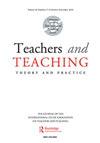Performing without a script: a dramaturgical analysis of the first cohort of Senior High School teachers in the history of Philippine education
IF 1.9
2区 教育学
Q2 EDUCATION & EDUCATIONAL RESEARCH
引用次数: 0
Abstract
ABSTRACTIn 2013, the Philippines shifted from a ten to a thirteen year basic education curriculum. Expanding the number of years of schooling necessitated the addition of new grade levels, including Grades 11 and 12, collectively referred to as ‘Senior High School’. The teachers who first taught in these levels were in a situation in which they had to carry out their work without a prescribed modus operandi. There was no precedent for how one dealt with students, administrators, or parents. Nevertheless, these teachers had to carry on with their work. Using data gathered from 19 FGD participants, this paper examined the experiences of the pioneer batch of instructors to handle Grade 11 and 12 students. Goffman’s (1956) dramaturgical approach was a useful heuristic for understanding the data. It is underpinned by the assumption that social interactions resemble stage performances, with individuals performing roles for audiences. The pioneering batch of teachers could, thus, be understood as actors having to play the role of competent educator to audiences of students and parents without a fully-written script, in the form of existing modus operandi. The difficulties of their role are compounded by bureaucratic uncertainty among administrators, their backstage support staff.Keywords: Dramaturgysenior high school teachersPhilippinesK-12 transition Disclosure statementNo potential conflict of interest was reported by the author(s).无剧本表演:菲律宾教育史上第一批高中教师的戏剧分析
2013年,菲律宾将基础教育课程从10年改为13年。扩大受教育年限需要增加新的年级,包括11年级和12年级,统称为“高中”。最初在这些级别教学的教师处于这样一种情况,即他们必须在没有规定的操作方法的情况下开展工作。在如何对待学生、管理人员或家长方面,还没有先例。然而,这些教师必须继续他们的工作。本文利用19位FGD参与者的数据,考察了首批指导教师处理11年级和12年级学生的经验。Goffman(1956)的戏剧方法是理解数据的有用启发式方法。社会互动类似于舞台表演,个人为观众扮演角色,这一假设支持了这一观点。因此,这批先锋教师可以被理解为演员,他们必须在没有完整的剧本的情况下,以现有的手法,在学生和家长的观众面前扮演称职的教育者的角色。管理人员和后台支持人员之间官僚主义的不确定性,加剧了他们扮演角色的困难。关键词:戏剧;高中教师;菲律宾高中-12年级过渡披露声明作者未报告潜在的利益冲突。
本文章由计算机程序翻译,如有差异,请以英文原文为准。
求助全文
约1分钟内获得全文
求助全文
来源期刊

Teachers and Teaching
EDUCATION & EDUCATIONAL RESEARCH-
CiteScore
4.20
自引率
7.40%
发文量
71
期刊介绍:
Teachers and Teaching: theory and practice provides an international focal point for the publication of research on teachers and teaching, in particular on teacher thinking. It offers a means of communication and dissemination of completed research and research in progress, whilst also providing a forum for debate between researchers. This unique journal draws together qualitative and quantitative research from different countries and cultures which focus on the social, political and historical contexts of teaching as work. It includes theoretical reflections on the connections between theory and practice in teachers" work and other research of professional interest.
 求助内容:
求助内容: 应助结果提醒方式:
应助结果提醒方式:


